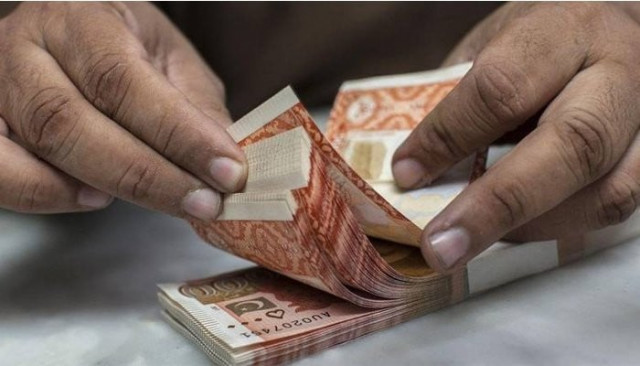Rs472b granted despite fiscal crunch
Govt approves 11 projects including those aimed at flood rehabilitation and luring urban and rural voters

Amid a scarcity of fiscal resources, the government on Wednesday approved 11 projects worth Rs472 billion – a mixed bag of essential flood rehabilitation projects and politically motivated schemes aimed at luring urban and rural voters.
The Executive Committee of the National Economic Council (ECNEC) – the highest project approving authority – approved these schemes including massively rationalising the cost of the Sindh government’s flagship Flood Response Emergency Housing project. The Express Tribune had earlier reported that the project had been approved at the inflated cost of Rs330 billion in haste – a cost that the ECNEC on Wednesday cut to Rs160 billion.
Finance Minister Ishaq Dar chaired the ECNEC meeting.
The ECNEC approved the National Development Internship Programme to give 20,000 internships in a bid to counter the PTI’s youth narrative. The stipends, however, will be paid out of the contingency budgets of the approved schemes – which may create fiscal issues for these projects.
The programme is in line with the prime minister’s vision to mainstream the youth and involve them in national development, according to a handout issued by the finance ministry. The expenditure of the programme will be met from the development projects being implemented under PSDP, it added.
The ECNEC also approved the Prime Minister’s Youth Laptop Scheme-HEC (Phase-III) for Rs10.9 billion to provide talented students with the opportunity to study in higher education institutes of the public sector across the country including Azad-Jammu and Kashmir (AJK) and Gilgit-Baltistan, said the ministry. The Flood Response Emergency Housing Project was also approved at the rationalised cost of Rs160 billion including a World Bank loan of $500 million to support the flood affected people in all districts of Sindh in climate-resilient reconstruction and repairs of their houses.
The ECNEC had earlier approved the project on October 28 at a total cost of Rs330 billion which has now been cut by Rs170 billion. The World Bank has already approved a $500 million loan for the scheme.
The Planning commission submitted a summary regarding the Indus Highway (N-55) additional carriage project. The ECNEC allowed 15% of procurement for one of the four components of the project in US dollars as per the Asian Development Bank (ADB) guidelines. The project had already been approved by the ECNEC on October 1, 2022, at a cost of Rs44.7 billion with an ADB share of Rs40.2 billion.
The ECNEC approved the construction of the Northern Section of Ring Road (Missing Link) from Warsak Road to Nasir Bagh Road project at the reduced cost of Rs17.2 billion, fully funded by government of Khyber-Pakhtunkhwa. The project envisages the construction of a 6-lane Northern section of Peshawar’s Ring Road from Warsak Road to Nasir Bagh Road with a total length of 7.8 Km.
The ECNEC also approved the construction of the Gravity Flow Water Supply Scheme in Mansehra at Rs18.6 billion. The project aims at providing a gravity flow potable water supply system for the city to fulfil its present and future needs up to 2040. The project, upon completion, will provide the required potable water supply facilities to a population of 201,249 people for the designed period.
The ECNEC approved the post-Flood 2022 Reconstruction Plan: Resilience, Enhancement and Livelihood Diversification in Balochistan, a project costing a total of Rs88 billion funded by the World Bank.
The centre and government of Balochistan will execute the project with a focus on the flood-ravaged and resource-constrained province, according to the finance ministry.
The ECNEC approved the Special Development Initiatives for poor districts in the country for Rs40 billion on an equal cost-sharing basis between federal and provincial governments. The project aims to support interventions to bring noticeable change in the social and economic fabric of these districts. However, no allocation was made for the project in the budget.
The finance ministry further added that an Overseas Scholarship for MS and M Phil leading to PhD in selected fields had also been approved at the cost of Rs22.2 billion to give young Pakistani scholars a chance to pursue higher education at some of the world’s leading universities.
A project regarding the provision of Higher Education Opportunities for students in Balochistan and erstwhile FATA was also approved for Rs8.6 billion intending to provide equal educational opportunities to the talented students of the disadvantaged areas to bring them at par with the rest of the country.
Finally, the Sindh Human Capital Investment: 1000 days-Integrated Health and Population programme was also approved by the ECNEC at a total cost of Rs61.6 billion to improve the utilisation and quality of reproductive, maternal, neonatal, child and adolescent health and nutrition services.
Published in The Express Tribune, January 5th, 2023.
Like Business on Facebook, follow @TribuneBiz on Twitter to stay informed and join in the conversation.


















COMMENTS
Comments are moderated and generally will be posted if they are on-topic and not abusive.
For more information, please see our Comments FAQ